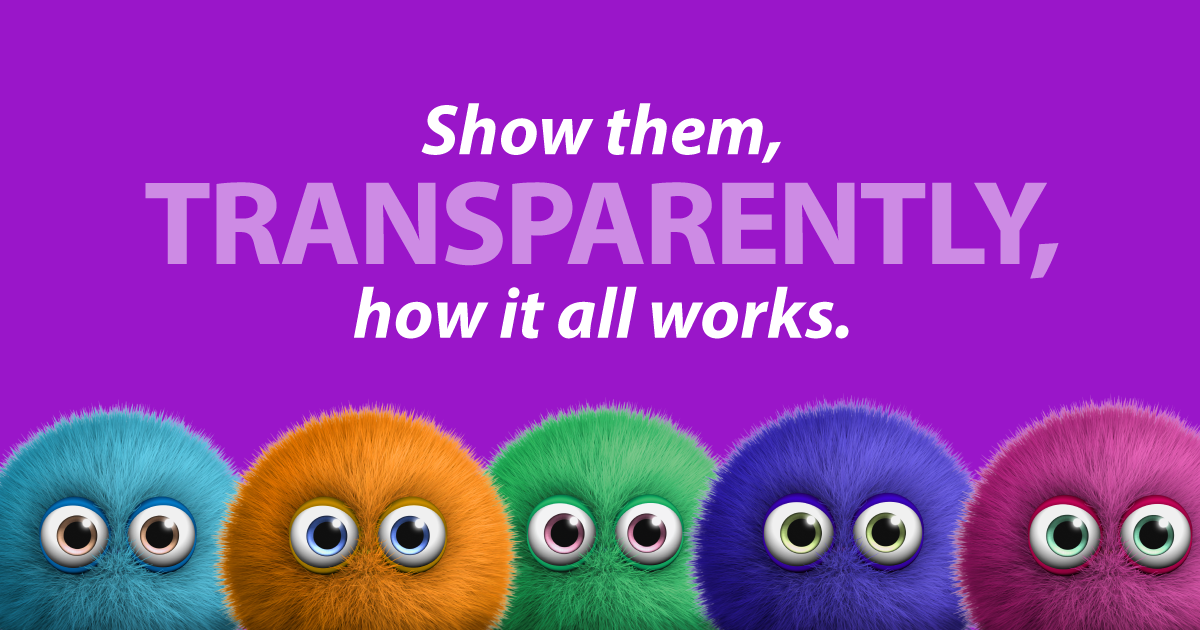
Let’s get unapologetically, radically transparent
No, I don’t mean transparent as in “invisible” or “see-through,” and I certainly don’t mean “difficult-to-find.” The word transparency could refer to a lot of things inside a credit union, but for our purposes we just have to ask one question:
Do people know how a credit union works?
We know that people see “credit union” and they think “bank.” But we also know there’s so much more. So give them a look inside, a VIP-tour. Show them, transparently, how it all works.
Put things in terms members can understand
Financial education is all well and good. In fact, it’s incredibly important. But what about CU education?
Your members don’t walk through the door knowing how your processes and products work. Credit union diehards might feel like these things are common knowledge, but I promise you, they’re not. This is where a little CU education goes a long way.
If members are the owners, why not explain how things actually work? Believe it or not, the world is still mostly full of rational, reasonable people, and they’re less likely to get all riled up if they understand why things happen a certain way.
Teaching people is a no brainer. There’s so little to lose and so much to gain. When you have to deny a loan application, explain why and how they can improve their chances for next time. Spell out why checking accounts don’t accrue interest. And for Pete’s sake, stop putting a big old percentage rate on your ads.
Focus on making everything easy to understand. When people really, truly get how it all works, good news becomes great, and bad news gets a little better.
Show your members why you’re different
One of the big draws of joining a credit union is that you’re not just a consumer, you’re a member-owner. The CU doesn’t have to worry about shareholders, and it puts all that extra money and effort into making member’s lives easier.
But you know this. We know this. Members should know this. Sometimes, it feels like everyone knows this…. except, you know, all those people who don’t seem to understand what a credit union is.
So maybe it’s worth trying something new, something radical. Maybe you should just start telling the unembellished truth. Don’t hide it in the fine print. Shout it from the rooftops!
Tell them why the CU does what it does. Clearly, without caveats or asterisks. Then, double down on what makes your credit union and your membership special. Show them that they are the priority.
Get out of the bank-think, and start thinking cooperatively. A credit union and its members should be the ultimate team. People helping people to live better lives.
Don’t forget to show off a little bit
Charitable and nonprofit organizations figured it out a long time ago: People have to trust you, and to earn that trust, you have to explain why you’re trustworthy.
Charities developed a rating system, so why couldn’t credit unions do something similar? Why not advertise how efficient and effective you are? Show them the money. Boast a little bit. Toot your own horn.
You wouldn’t have to wait for a third party to start doing this, by the way. Someone at the CU knows how much money you put into helping your members, so why doesn’t everyone?
After all, we already mentioned how credit unions have a natural advantage over their competition: CUs don’t have to pay shareholders. Before you even get started, this fact alone gives you a leg up and makes you look good.
Transparency shows trust
If you can take the time and the effort to help people understand what makes a CU tick, you’re going to see that loyalty returned over and over again. Pulling back the curtain makes people feel special, like they’re in-the-know. You’re giving them something no other financial institution probably will.
And why not? Credit unions are in the perfect position to differentiate themselves by increasing their transparency. And we know this stuff matters.
- In Case You Missed It – 3.12.25 - March 11, 2025
- Three young members you can help in 2025 - January 14, 2025
- Have you thanked your website lately? - November 19, 2024
